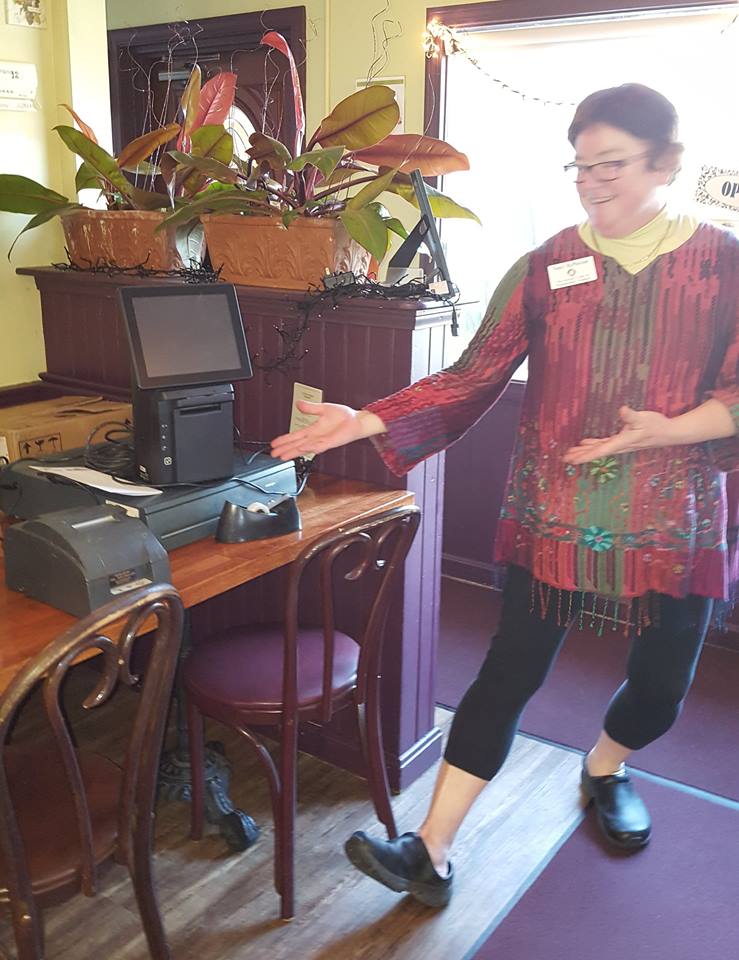Weekly Bulletin - May12th Meeting
Posted by Richard Garcia
on May 18, 2016

Nancy McPherson displays her new food order processing equipment for this summer's Wings & Wheels events at Minuteman Air Field
Guests:
- Gary Hough, speaker, Wachusett Club
- Sharon Hough, spouse of Gary
- Gino Frattellone, Littleton Club
Announcements:
- 223 Rotarians have signed up for the District Conference on May 20-22.
- Next week, we will hear about the Guyana Playground Project and Yvonne will talk about the RFK discharge kits that the Club has agreed to fund; then we will get an update about the Guatemala Rainwater Harvesting Project; then a Club Assembly, when we’ll discuss important club business. Then on June 7, we have a special Tuesday evening meeting with the Bolton Lions club at the Ayer Billiards Café. The cost is $12 per person; RSVP to Karin by June 1.
- The Bolton Repair Café is happening this Saturday, May 14.
- Wings and Wheels: Carolyn Reed is this year’s volunteer coordinator; everyone is encouraged to sign up for a shift during the weeks when our Club is hosting.
- On May 25, the Nature Connection is holding “Inspire,” a benefit. Tickets are $75 for a silent auction, jazz quartet, food, open wine bar and special guest speaker Irene Pepperberg, author of Alex & Me, a NY Times bestseller.
- Sponsors are needed for Wings & Wheels; sponsors are accepted throughout the season, with ads in the program, banners (for large donors), and table space. We now have $7,600; our goal is $10,000.
Happy/sad fines:
- Mary: very happy. We finally received the insurance check for the contents of the house (after 14 months); made the decision to sell the house “as is,” which sold in 3 days, and received more than the asking. Also happy that we’re pre-approved for a mortgage to buy the condo we’re now renting. Finally, grateful for the love and support of members.
- Dan: sad that he has no one-dollar bills to contribute.
- Laura: grateful to Dan for his work on the social media seminars, which are now posted on YouTube; and thankful for Karin’s efforts to recruit sponsors to Wings and Wheels.
- Chris: happy for our Club’s strong showing at the grant process training.
- Nancy: happy to announce improvements to the Wings & Wheels food payments, resulting in faster service.
- Karin: glad that Gary is here; and happy for Mary and Rich.
- Ron: took his dog, Kirby, in for a physical. Sad that Kirby has a tumor (benign) that keeps growing.
- Gary: happy to be here. (Wachusett club is one of the very few that meets Friday morning.)
- Bob: continues to have a great time with his granddaughter.
- Brian: excited over the possibility of opening a dog grooming salon on Route 117 in Stow.
- Jim: grateful for the sunshine, and to be able to come to his first Rotary meeting of the year with the top down.
Speaker:
Our speaker was Gary Hough, 2016-17 President of the Wachusett Rotary Club (and NEADS Board member). He spoke to us about NEADS (National Education for Assistance Dog Services, also known as Dogs for Deaf and Disabled Americans). NEADS is a 501(c)(3) non-profit organization that was established in 1976 and is based in Princeton, Massachusetts. Its Service Dogs become an extension of their handlers and bring freedom, physical autonomy and relief from social isolation to their human partners who are deaf or have a disability.
Gary became interested in NEADS through Rotary. The program is captivating; the more he found out about it, the more interested he became, until finally he became a board member.
NEADS trains dogs for people with disabilities. It began with hearing disabilities. They’re trained to recognize when someone calls the owner’s name and calls his attention, to recognize fire alarms, doorbells, and telephone rings. Training now extends to a variety of disabilities. One program is service dogs for autistic children, which helps them become more social, more welcoming—in one case, within six weeks. The most recent program resulted from the Boston Marathon bombing.
NEADS buys dogs from service dogs for the blind. Dogs for the blind should be leaders; NEADS dogs should be followers. If there ever is a problem, a staff geneticist will remove that strain from the program. Dogs are socialized at a campus in Princeton for a month, then go to a trainer in the prison system in Massachusetts and Rhode Island. Inmates are carefully vetted and themselves trained. There are some 80-85 dogs being trained, for another 18 months, then handed over to “puppy trainers” in a home environment, exposed to different stimuli. If a dog “washes out,” it’s sold as a pet for about $1600. It would be the most highly trained pet imaginable. Meanwhile prospective clients fill out an extensive questionnaire, then a personal interview. Every detail about the home, family, disability, etc., helps to match the client and the dog.
Dogs are typically black labs, sometimes golden retrievers. Other breeds, even chocolate labs, tend to be too independent.
Question: Do trainers become attached to the dogs? When the dog is assigned to a client, he first meets the puppy trainer, then the prison inmate, which gives him a sense of closure to the process. They look for long-term inmates, for continuity. It takes so long to train the trainers that they’d like not to have to constantly train new ones.
Question: Are there other organizations that provide this service? NEADS serves the entire US. There are other organizations, but NEADS provides the best service, as attested by the ADA and veterans organizations.
Question: What is it about labs that makes them the best breed? It’s in their blood to please their owners.
Fair warning: people are welcome to visit the two graduation ceremonies per year, when people can share what the dog means to them. But it’s so heartwarming, you’ll get sucked into the mission of NEADS.
